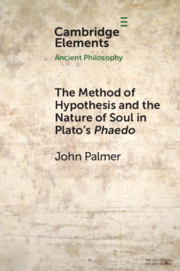Element contents
The Method of Hypothesis and the Nature of Soul in Plato's Phaedo
Published online by Cambridge University Press: 15 January 2021
Summary
Keywords
- Type
- Element
- Information
- Series: Elements in Ancient PhilosophyOnline ISBN: 9781108946254Publisher: Cambridge University PressPrint publication: 11 February 2021
References
- 8
- Cited by



